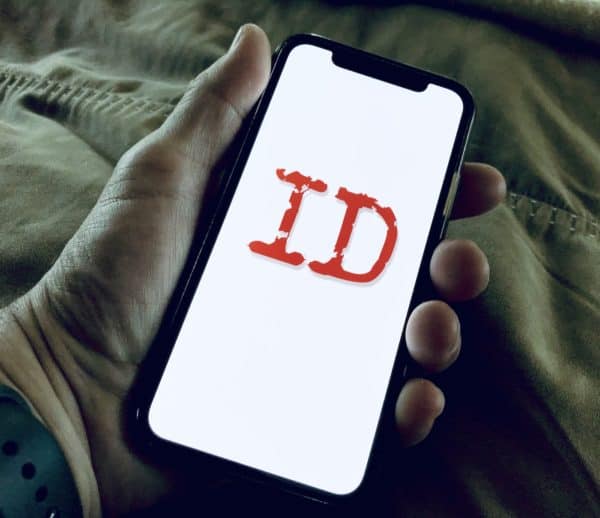When you go to a bar and give your ID to the bartender, do you ever think about how much you’re giving away?
Let’s say you use your driving license as your ID; you’re letting the bartender know that you’re not underage, but you’re also giving them access to your date of birth, your full name, and your home address. Imagine if there was a way to only share the data you had to, rather than surrendering every piece of information.
From the UK’s data protection acts, to the Cambridge Analytica scandal, it’s clear that the threat to user data is still front of mind for both citizens and regulators alike. Now more than ever, information capitalism means that data, whether rightly or wrongly, is a commodity. For instance, it emerged in 2019 that Facebook was sitting on a database of millions of user phone numbers, and in the same year the company admitted to listening to users conversations through messenger. Even biological information isn’t safe after the DNA testing company FamilyTreeDNA admitted to sharing customer’s genetic data with the FBI in secret. In response, people are reconsidering how much they share online, and are looking for ways to ensure the privacy and security of their information.
With vast amounts of information moving around the world every second, ensuring its security is essential.
Being able to selectively provide data such as in the bar example, then, would be a huge step for data privacy. This is where cryptography comes in. Privacy is one of the core beliefs of the crypto space; it’s central in everything we do.

Cryptography is a key tool for keeping institutional powers in check and making sure that data is controlled by the people it belongs to. At my firm, we undertake research to investigate the technologies that could be used to improve privacy, inclusive accountability, and personal agency.
One area of research that we’ve been involved in is ‘zero-knowledge proofs’, specifically zk-SNARKs (a particular type of zero-knowledge proof) and smart contracts which could be applied to a blockchain setting. Zero-knowledge proofs can allow for greater privacy of information and data, which makes them especially interesting in today’s climate.
Zero-knowledge proofs (ZKPS) are a technique in cryptography that makes blockchains scalable and ultra-private, allowing information to be verified without revealing it to anyone but the recipient; for instance, you could prove your age at a bar without having to reveal everything else that comes with an ID card, like address or date of birth.
ZKPs use encryption to secure user data and ensure confidentiality when interacting with apps and financial processes. It’s a zero-knowledge proof of knowledge – you prove the information without giving any more than necessary away. This concept is powerful in itself, but especially in the age of information capitalism. People will still give up data in return for a service, as has been the case in previous years, but this will be much more selective. These ZKPS can be used to protect personal data, and are an exciting prospect not only for the crypto and blockchain space, but for any industry.
 ZKPs also help to securely integrate smart contracts into the blockchain. Smart contracts, programmes which automatically execute the terms of an agreement, eliminate the need for third parties, are important for privacy and security. However, they require a large amount of computing power to maintain, and as blockchains grow in capability, more and more information must be recorded, which requires huge amounts of storage space. In some cases, this can limit the number of people who can access the technology. For companies like us, who want our platform to be accessible on cell phones for those in rural areas in countries like Uganda and Ethiopia, a solution needs to be found.
ZKPs also help to securely integrate smart contracts into the blockchain. Smart contracts, programmes which automatically execute the terms of an agreement, eliminate the need for third parties, are important for privacy and security. However, they require a large amount of computing power to maintain, and as blockchains grow in capability, more and more information must be recorded, which requires huge amounts of storage space. In some cases, this can limit the number of people who can access the technology. For companies like us, who want our platform to be accessible on cell phones for those in rural areas in countries like Uganda and Ethiopia, a solution needs to be found.
ZKPs are the answer. They allow transactions on the blockchain to be truncated, or shortened. This means that despite growth of the blockchain, for instance as it comes to include identity and compatibility with many different types of asset, participants don’t have to worry about storing information that would take up lots of space. As a result, the blockchain’s growth isn’t compromised by a lack of storage space, and can scale as it needs to. By bringing together both scalability and privacy, zero-knowledge proofs can increase universal inclusion in blockchain.
ZKPs aren’t just for cryptocurrency. They are applicable to a range of global issues that could benefit from the use of blockchain.
Other than personal identification in a bar, for instance, ZKPs have the potential to be used in supply chains, healthcare, finance, and a range of other industries where the security of private information is essential.
Concerns around the misuse of private data – in particular by the tech giants, or ‘FAANGS’ are legitimate, and growing. As a result, it’s vital to investigate technologies to give people greater control over their own data. Personal sovereignty has long been an essential feature of blockchain, and this continues to be the case with zero-knowledge proofs.
Through ZKPs, privacy is always the priority, and the individual knows their information is safe without compromising their access to services that require identification or data. ZKPs scalability potential means that blockchains can continue to grow, giving people even more freedom and control of their information. As we move towards a more secure future, data privacy will be at the forefront of people’s minds; zero-knowledge proofs, then, will have an important role to play.

Charles Hoskinson is CEO at IOHK. Hoskinson is a Colorado-based technology entrepreneur and mathematician. He attended Metropolitan State University of Denver and University of Colorado Boulder to study analytic number theory before moving into cryptography through industry exposure. His professional experience includes founding three cryptocurrency-related start-ups – Invictus Innovations, Ethereum and IOHK – and he has held a variety of posts in both the public and private sectors. He was the founding chairman of the Bitcoin Foundation’s education committee and established the Cryptocurrency Research Group in 2013. His current projects focus on educating people about cryptocurrency, being an evangelist for decentralization and making cryptographic tools easier to use for the mainstream. This includes leading the research, design, and development of Cardano, a third-generation cryptocurrency that launched in September 2017.


